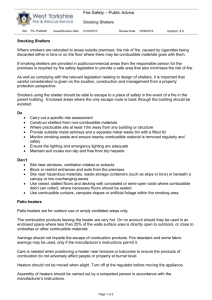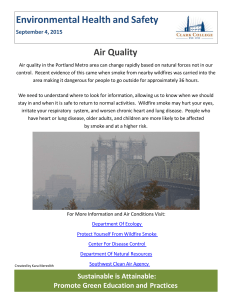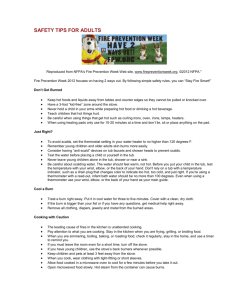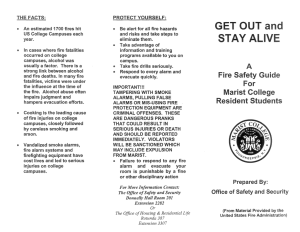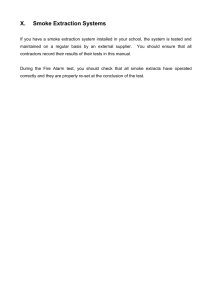F A C T S H E E T A
advertisement
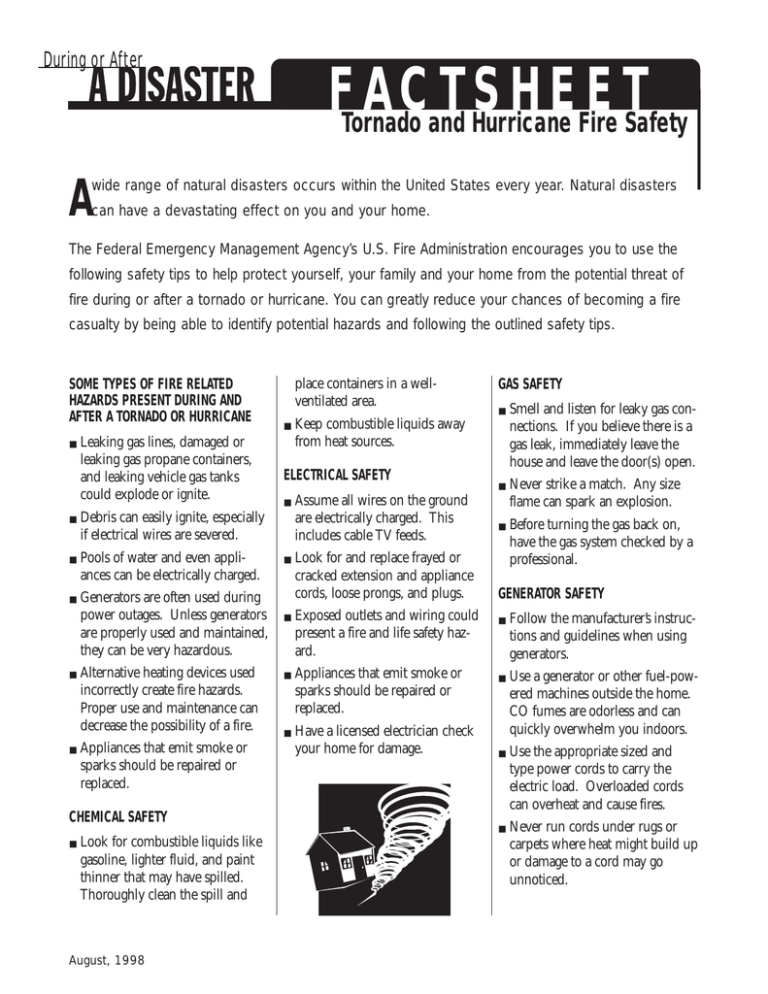
During or After FTornado A CandT Hurricane S H E Fire E TSafety wide range of natural disasters occurs within the United States every year. Natural disasters A can have a devastating effect on you and your home. The Federal Emergency Management Agency’s U.S. Fire Administration encourages you to use the following safety tips to help protect yourself, your family and your home from the potential threat of fire during or after a tornado or hurricane. You can greatly reduce your chances of becoming a fire casualty by being able to identify potential hazards and following the outlined safety tips. SOME TYPES OF FIRE RELATED HAZARDS PRESENT DURING AND AFTER A TORNADO OR HURRICANE ■ Leaking gas lines, damaged or leaking gas propane containers, and leaking vehicle gas tanks could explode or ignite. ■ Debris can easily ignite, especially if electrical wires are severed. ■ Pools of water and even appliances can be electrically charged. ■ Generators are often used during power outages. Unless generators are properly used and maintained, they can be very hazardous. ■ ■ Alternative heating devices used incorrectly create fire hazards. Proper use and maintenance can decrease the possibility of a fire. Appliances that emit smoke or sparks should be repaired or replaced. place containers in a wellventilated area. ■ ■ ■ Smell and listen for leaky gas connections. If you believe there is a gas leak, immediately leave the house and leave the door(s) open. ■ Never strike a match. Any size flame can spark an explosion. ■ Before turning the gas back on, have the gas system checked by a professional. Keep combustible liquids away from heat sources. ELECTRICAL SAFETY ■ GAS SAFETY Assume all wires on the ground are electrically charged. This includes cable TV feeds. Look for and replace frayed or cracked extension and appliance cords, loose prongs, and plugs. ■ Exposed outlets and wiring could present a fire and life safety hazard. ■ Appliances that emit smoke or sparks should be repaired or replaced. ■ Have a licensed electrician check your home for damage. GENERATOR SAFETY ■ Follow the manufacturer’s instructions and guidelines when using generators. ■ Use a generator or other fuel-powered machines outside the home. CO fumes are odorless and can quickly overwhelm you indoors. ■ Use the appropriate sized and type power cords to carry the electric load. Overloaded cords can overheat and cause fires. ■ Never run cords under rugs or carpets where heat might build up or damage to a cord may go unnoticed. CHEMICAL SAFETY ■ Look for combustible liquids like gasoline, lighter fluid, and paint thinner that may have spilled. Thoroughly clean the spill and August, 1998 ■ Never connect generators to another power source such as power lines. The reverse flow of electricity or “backfeed” can electrocute an unsuspecting utility worker. AND REMEMBER... ■ Be careful when using candles. Keep the flame away from combustible objects and out of the reach of children. ■ Some smoke alarms may be dependent on your home’s electrical service and could be inoperative during a power outage. Check to see if your smoke alarm uses a back-up battery and install a new battery at least once a year. ■ Smoke alarms should be installed on every level of your home. ■ All smoke alarms should be tested monthly. All batteries should be replaced with new ones at least once a year. ■ If there is a fire hydrant near your home, keep it clear of debris for easy access by the fire department. HEATING SAFETY ■ Kerosene heaters may not be legal in your area and should only be used where approved by authorities. ■ Do not use the kitchen oven range to heat your home. In addition to being a fire hazard, it can be a source of toxic fumes. ■ Alternative heaters need their space. Keep anything combustible at least 3 feet away. ■ Make sure your alternative heaters have “tip switches.” These “tip switches” are designed to automatically turn off the heater in the event they tip over. ■ Only use the type of fuel recommended by the manufacturer and follow suggested guidelines. ■ Never refill a space heater while it is operating or still hot. ■ Refuel heaters only outdoors. ■ Make sure wood stoves are properly installed, and at least 3 feet away from combustible materials. Ensure they have the proper floor support and adequate ventilation. ■ Use a glass or metal screen in front of your fireplace to prevent sparks from igniting nearby carpets, furniture or other combustible items. FOR MORE INFORMATION CONTACT: The United States Fire Administration Office of Fire Management Programs 16825 South Seton Avenue Emmitsburg, Maryland 21727 Or visit the USFA web site: www.usfa.fema.gov August, 1998
